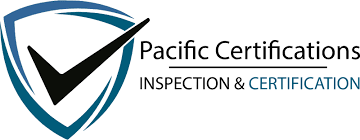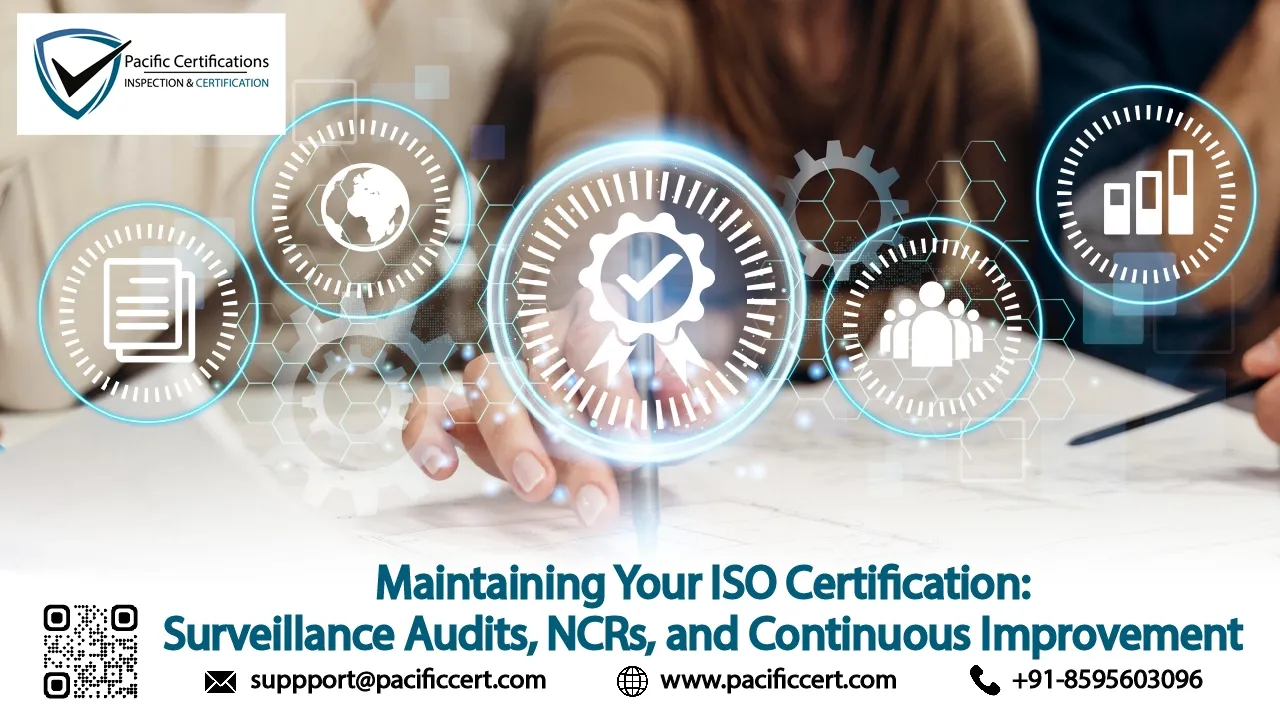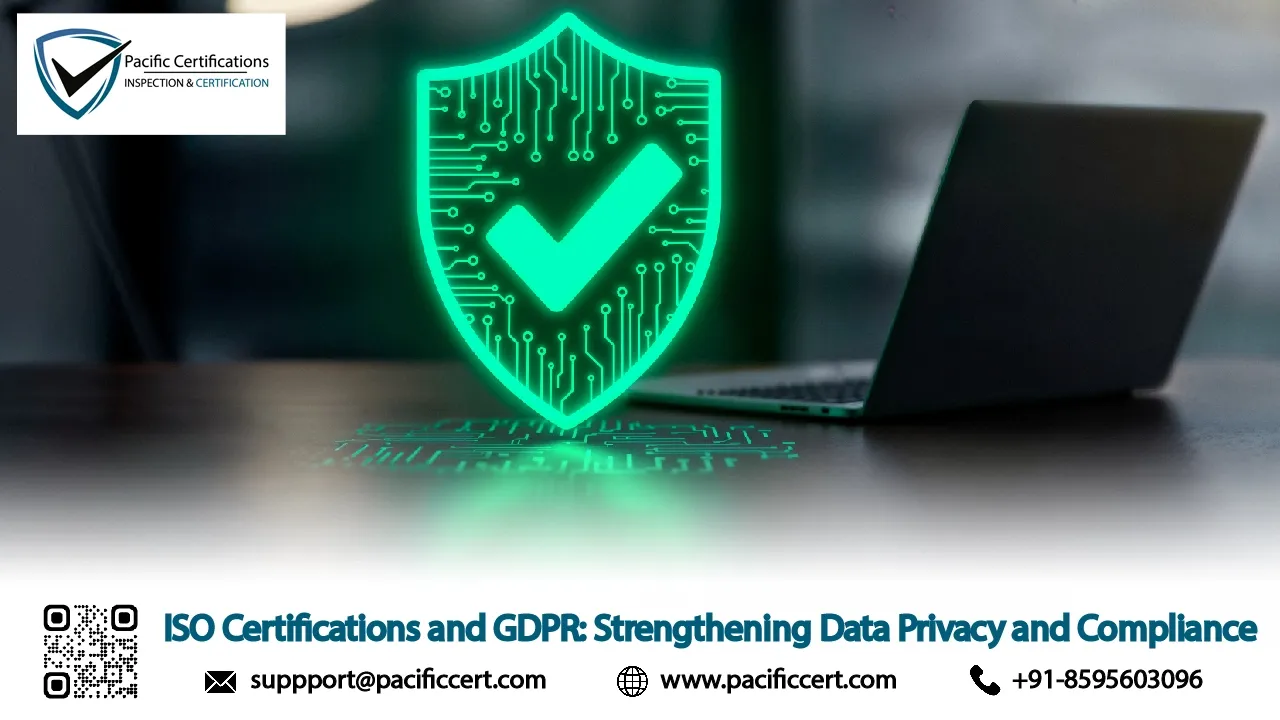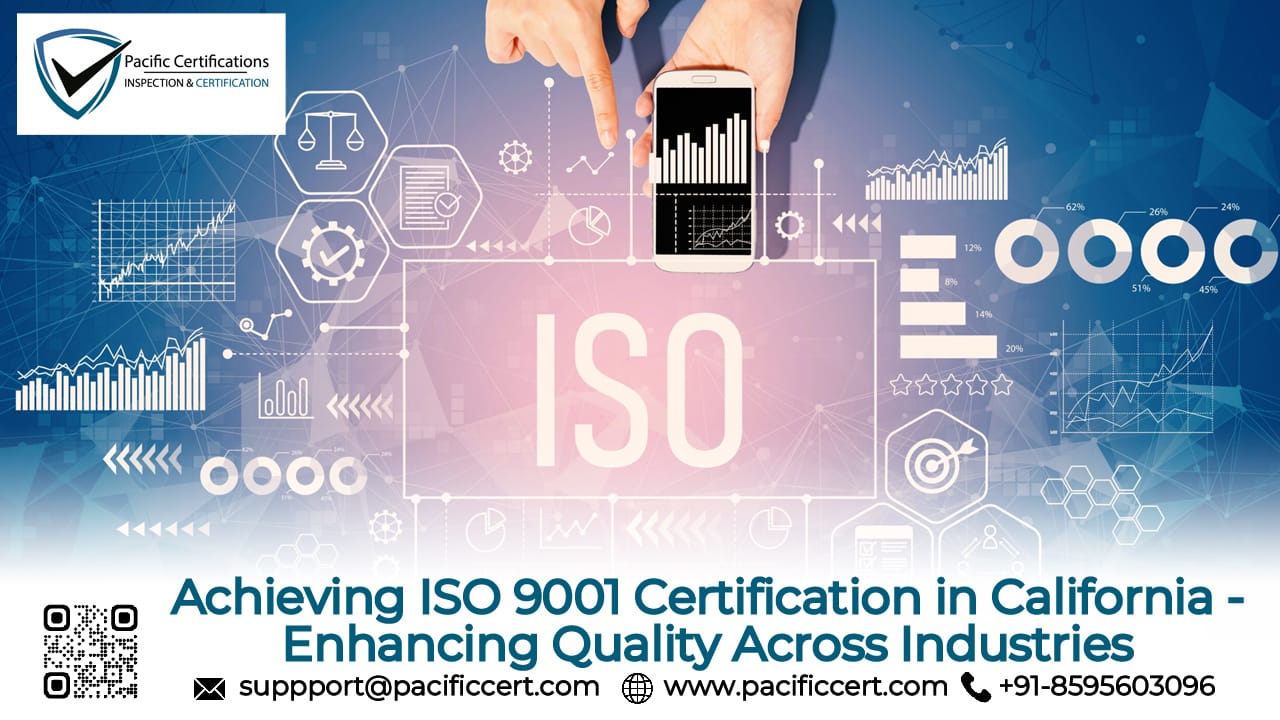
ISO 9001:2015 in California
California is home to some of the world’s most dynamic industries, from high-tech and aerospace to food processing, biotech, education, and manufacturing. Across these sectors, one thing remains constant: quality drives competitiveness, reputation, and customer satisfaction. That’s why many organizations across the Golden State are pursuing ISO 9001:2015 certification, the globally recognized standard for Quality Management Systems (QMS).
Whether you're a Silicon Valley software company, a Fresno-based agriculture exporter, or a Los Angeles manufacturer, ISO 9001:2015 provides a framework to ensure your processes are well-documented, consistently applied, and continuously improved.
What Is ISO 9001:2015?
ISO 9001:2015 is the latest version of the ISO 9001 standard, published by the International Organization for Standardization (ISO). It sets out the criteria for a quality management system, helping organizations ensure that their products and services consistently meet customer and regulatory requirements.

This standard is based on seven quality management principles:
- Customer focus
- Leadership
- Engagement of people
- Process approach
- Improvement
- Evidence-based decision making
- Relationship management
It’s designed to be flexible and applicable to any industry, from government agencies and educational institutions to large corporations and fast-scaling startups.
If your California-based organization is looking to enhance product quality and efficiency, Pacific Certifications can assist you in getting ISO 9001 certified. Email us at support@pacificcert.com.
Why California Businesses Are Prioritizing ISO 9001 Certification
California leads the U.S. in innovation, exports, and environmental sustainability, but it’s also one of the most competitive and regulated states. ISO 9001 certification has become a strategic asset for businesses across California seeking to stand out, meet client demands, and improve internal control.
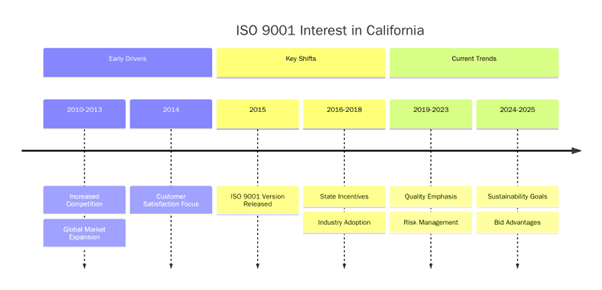
Here’s why certification is gaining traction:
- Government and private contracts increasingly require ISO 9001 as a prerequisite.
- Clients expect standardized quality practices and transparent processes.
- The state’s booming export economy requires compliance with international standards.
- ISO 9001 aligns with Lean, Six Sigma, and Total Quality Management (TQM) initiatives popular in California’s manufacturing and healthcare sectors.
Whether your focus is improving internal efficiency or enhancing customer satisfaction, ISO 9001 provides a proven blueprint.
Pacific Certifications supports businesses across California, from San Diego to Sacramento—with certification audit support. Reach us at support@pacificcert.com.
Benefits of ISO 9001 Certification for California Organizations
Achieving ISO 9001:2015 certification can significantly elevate your organization’s performance. Here are the primary benefits:
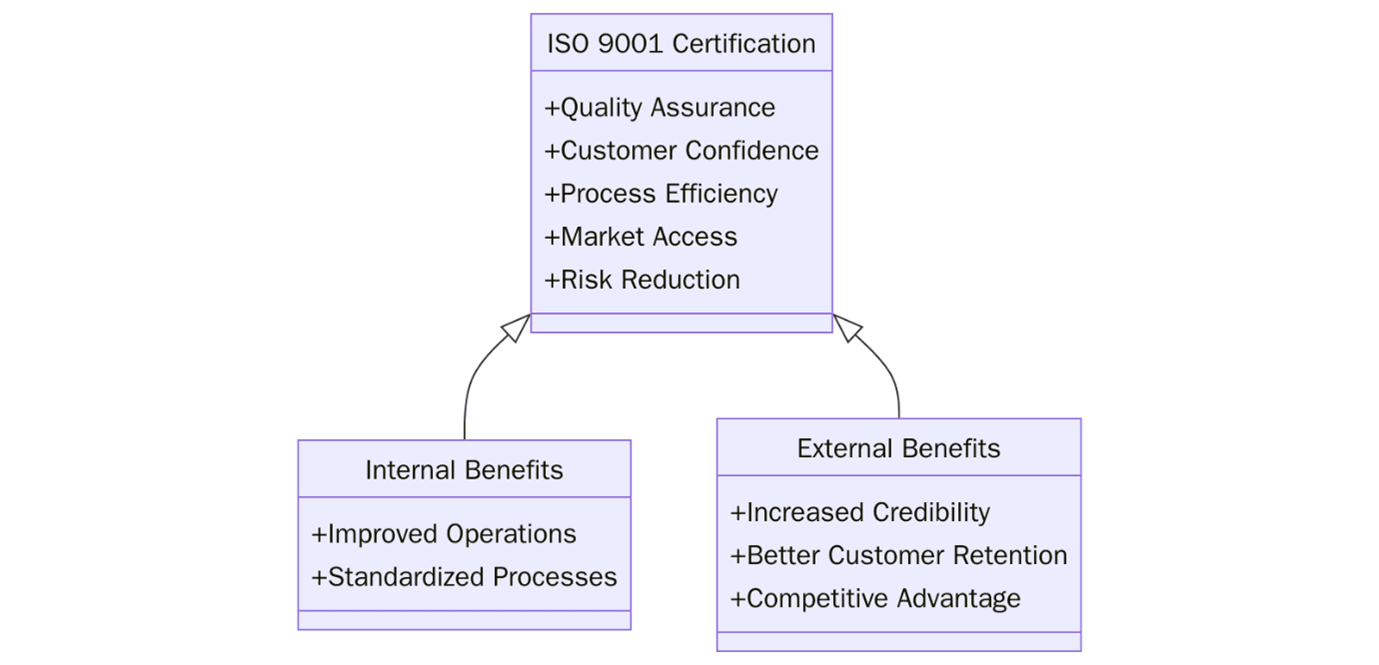
- Improves customer satisfaction by ensuring consistent quality and delivery
- Enhances process efficiency, reducing waste, errors, and rework
- Boosts employee engagement through clear roles, training, and accountability
- Demonstrates compliance with U.S. and international regulatory frameworks
- Strengthens supply chain credibility, especially in B2B environments
- Enhances brand reputation and opens up new business opportunities
- Facilitates international market access with a globally recognized standard
- Establishes a framework for continuous improvement and innovation
To start realizing these benefits in your sector, whether in aerospace, clean energy, education, or logistics—contact us at Pacific Certifications for expert guidance at support@pacificcert.com!
ISO 9001 Certification Timeline
The timeline for ISO 9001 certification varies depending on the size, complexity, and readiness of your organization. Here’s a general roadmap for small to mid-sized enterprises in California:
| Stage | Activities | Timeline |
| Gap Analysis | Assess existing systems vs ISO 9001 requirements | 1–2 weeks |
| Implementation Planning | Define scope, assign responsibilities, set quality objectives | 2 weeks |
| Documentation Development | Draft or update QMS manuals, procedures, and work instructions | 2–4 weeks |
| Training & Awareness | Educate teams on ISO 9001 processes, quality principles | 1–2 weeks |
| Internal Audit & Review | Perform mock audits and corrective actions | 2 weeks |
| Stage 1 & Stage 2 Audit | External audit by certification body | 2–4 weeks |
Estimated Total Timeline: 3 to 4 months for most SMBs; larger enterprises may take 6+ months.
Pacific Certifications offers fast-track certification packages and on-site audits across California. Contact us at support@pacificcert.com to book your timeline consultation!
Steps to Achieve ISO 9001 Certification in California
The path to ISO 9001 certification is structured and repeatable. Here’s how California-based organizations can approach it:
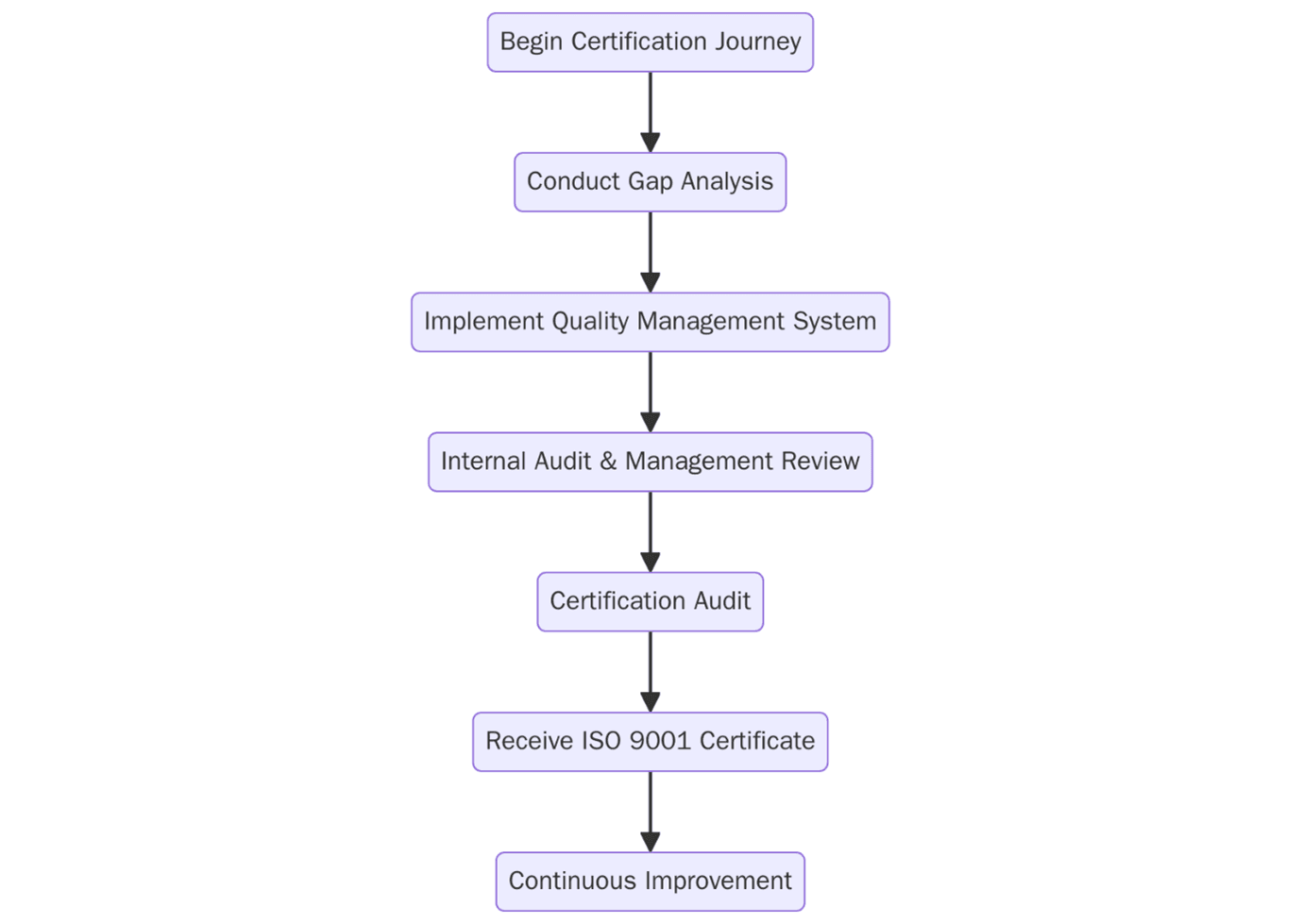
- Determine certification scope (departments, sites, product lines)
- Conduct a gap analysis of current quality practices vs ISO 9001:2015 requirements
- Develop QMS documentation, including quality policy, objectives, procedures, and records
- Train staff on roles, responsibilities, and QMS procedures
- Implement quality controls, measurement systems, and corrective actions
- Conduct an internal audit and management review
- Engage a certification body like Pacific Certifications for Stage 1 and Stage 2 audits
- Achieve certification, maintain compliance through annual surveillance audits
If you want help navigating this process efficiently, start at support@pacificcert.com.
Industries in California Actively Pursuing ISO 9001
ISO 9001:2015 is increasingly adopted by a wide range of industries in California, including:
- Technology & SaaS in San Jose, Palo Alto, and San Diego
- Manufacturing & Aerospace in Los Angeles and Long Beach
- Healthcare & Biotech in San Francisco and Irvine
- Food Processing & Agriculture in Central Valley and Fresno
- Education & Public Services across state universities and local agencies
- Logistics & Transportation in Oakland, Ontario, and Bakersfield
With rising consumer expectations and competitive pressure, ISO 9001 has become a benchmark for quality excellence statewide.
ISO 9001 in California – Your Competitive Advantage Starts Now
California is a land of innovation—but innovation without structure often fails to scale. ISO 9001:2015 certification provides the management framework to systematize quality, improve consistency, and build trust with customers, regulators, and partners.
Whether you’re aiming to win large contracts, enter international markets, or simply streamline operations, ISO 9001 certification sets your business apart in one of the world’s most competitive economies.
Pacific Certifications, an accredited certification body, helps organizations across California for audit and achieve ISO 9001:2015 certification with expert guidance, minimal disruption, and full compliance!
Contact us at support@pacificcert.com or visit www.pacificcert.com to begin your certification journey today!
FAQs
What does ISO 9001 certification in California cost?
Costs vary by size and complexity; Pacific Certifications provides fixed-fee quotes after a free gap call.
How long is an ISO 9001 certificate valid?
Three years, with yearly surveillance audits to ensure ongoing compliance.
Can startups get certified?
Yes—many California tech startups certify early to attract enterprise clients.
Does ISO 9001 cover environmental or safety issues?
Not directly; pair ISO 9001 with ISO 14001 for environment or ISO 45001 for safety.
How soon can we schedule our audit?
Pacific Certifications can arrange Stage 1 audits within about four weeks of readiness confirmation.
Ready to get ISO 9001 certified?
Contact Pacific Certifications to begin your certification journey today!
Suggested Certifications –
1. ISO 14001:2015
2.ISO 45001:2018
3.ISO 22000:2018
4.ISO 27001:2022
5.ISO 13485:2016
6.ISO 50001:2018
Read more: Pacific Blogs
